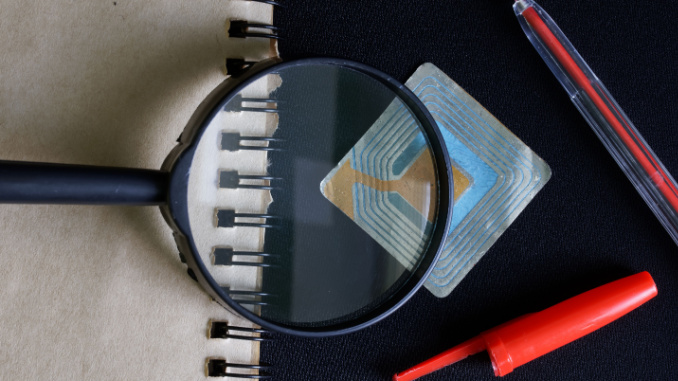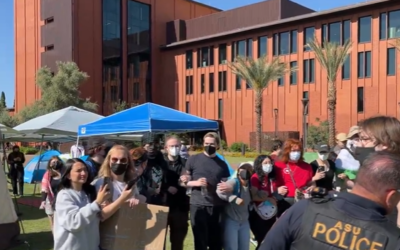By Corinne Murdock |
This school year, Scottsdale Unified School District (SUSD) incorporated controversial RFID chip trackers in student and faculty ID badges.
The district approved the chips in a close 3-2 vote in late June. Board members Libby Hart-Wells, Zach Lindsay, and Julie Cieniawski approved the chips; Amy Carney and Carine Werner opposed them. The estimated cost of the chips totaled $125,000.
The chip went through a trial run at Coronado High School before being implemented districtwide. The district reportedly upgraded their ID software to enable the chip system over the last two years.
During the June meeting, the SUSD governing board counsel explained that the chips enable the district to track students when they get on and off the buses.
Carney asked why the chips were put in all student IDs, and not just bus riders. The SUSD Safety & Security team, which will oversee the program, explained that buses aren’t limited to designated bus riders: any students may board the buses if they’re attending the Boys & Girls Club, field trips, or extracurricular or athletic events.
The safety team reported that the IDs can’t be used to track daily attendance because they’re only linked to the district’s transportation software. However, the team didn’t guarantee that the chip technology wouldn’t be expanded to other uses such as attendance in the future. The RFID chips within staff badges have an extra feature: they enable access to school buildings.
SUSD reported that the RFID chip doesn’t store any personally identifiable information, and that no RFID readers were installed inside the school for the purpose of tracking a student’s location.
Director Joshua Friedman said that the RFID chip translates as a coded number within a closed system, and therefore doesn’t qualify as a digital ID. Friedman also noted that the RFID chip doesn’t work as an active GPS tracker, but a passive one: the chips only record a time and location when a student boards or disembarks from a school bus.
Board President Julie Cieniawski remarked in closing that she and the majority of SUSD leaders weren’t interested in “conspiracy theories” of using RFID technology for ulterior motives.
Some SUSD parents have expressed concern with the tracking capabilities of the RFID chips, namely the inability to opt-out from the technology and potential suspensions for tampering with the IDs by attempting to remove the chip.
Former state lawmaker and SUSD teacher Michelle Ugenti-Rita wrote on Facebook that the RFID chips were an invasion of privacy.
“Have they never heard of ‘Find my iPhone?’ This is a complete invasion of privacy. Parents were never notified, or given the option to opt-in to the school district’s new government surveillance program,” said Ugenti-Rita. “What didn’t they learn from masking up our children during COVID? This is something our superintendent, Tom Horne, should investigate and the Legislature should ban when they convene next year.”
No opt-out exists for families who desire to forgo use of the chips. RFID, short for radio-frequency identification, is a technology that allows scanners to engage in automatic identification and data capture (AIDC). AIDC allows for computers to obtain data immediately without human involvement; other types of AIDC include QR codes and voice recognition technology.
During last week’s meeting, Superintendent Scott Menzel said that the chip readers enable the district to locate students using school transportation. Menzel reported that on the first day of school, three children didn’t arrive at their proper location. The superintendent reported that the ID system enabled them to locate them within five minutes, as opposed to 30 minutes or more.
In response to community pushback against the chips, SUSD issued a press release on Monday to further explain the RFID software.
“RFID is not a global positioning system (GPS) and has no tracking capability on its own. Like the RFID in your credit card and debit card, it only works when tapped. The district piloted this program last year and the Governing Board approved it,” stated SUSD. “The RFID in student ID cards is ONLY scanned so that the district’s Transportation department is able to account for those students who board and exit a bus.”
Corinne Murdock is a reporter for AZ Free News. Follow her latest on Twitter, or email tips to corinne@azfreenews.com.








